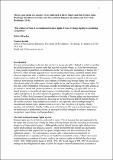Files in this item
The ethical terrain of international human rights : from invoking dignity to practicing recognition
Item metadata
| dc.contributor.author | Hayden, Patrick | |
| dc.contributor.editor | Steele, Brent J. | |
| dc.contributor.editor | Heinze, Eric | |
| dc.date.accessioned | 2020-01-02T00:34:13Z | |
| dc.date.available | 2020-01-02T00:34:13Z | |
| dc.date.issued | 2018-07-02 | |
| dc.identifier | 251775238 | |
| dc.identifier | d222169d-2cc2-46f8-b434-7f775931762c | |
| dc.identifier | 85131852218 | |
| dc.identifier.citation | Hayden , P 2018 , The ethical terrain of international human rights : from invoking dignity to practicing recognition . in B J Steele & E Heinze (eds) , Routledge Handbook of Ethics and International Relations . 1st edn , Routledge Taylor & Francis Group , pp. 276-288 . | en |
| dc.identifier.isbn | 9781138840201 | |
| dc.identifier.isbn | 9781315725932 | |
| dc.identifier.other | ORCID: /0000-0001-7731-0857/work/59953783 | |
| dc.identifier.uri | https://hdl.handle.net/10023/19214 | |
| dc.description.abstract | It is now commonplace to declare that we live in an age of rights. Indeed, it is fair to say that the global popularity of human rights has reached the point where, as Alan Gewirth phrases it, many people regard them as fundamental to the “civilizing and moralizing of human life.” However, while no topic arguably is as vital to international ethics, questions remain about what our rights are, who is entitled to claim certain rights, and how these rights should be implemented and enforced. The purpose of this chapter is to provide a guide to the intricate relations between the institutional development of international human rights, the central ethical principles offered to support human rights norms, and the politics of human rights. To this end, I draw inspiration from recent attempts to understand the making of rights claims as performative social and political practices. On this understanding, I propose that, for us to attend properly to the political significance of claiming rights, we should approach human rights and dignity as the achievements of generative struggles for recognition. In the first section, I offer a brief account of the translation of the idea of human rights into international legal norms and political institutions, focusing on the International Bill of Human Rights. In the middle section, I bring analytical attention to bear upon the ethical underpinnings of international human rights, characterized in terms of the four pillars of dignity, liberty, equality, and solidarity. Finally, I offer some reflections on the ways by which rights claims are positioned, in performative terms, as emergent political struggles to achieve reciprocal recognition, equal status, and human dignity. | |
| dc.format.extent | 359702 | |
| dc.language.iso | eng | |
| dc.publisher | Routledge Taylor & Francis Group | |
| dc.relation.ispartof | Routledge Handbook of Ethics and International Relations | en |
| dc.subject | Human rights | en |
| dc.subject | Dignity | en |
| dc.subject | Equality | en |
| dc.subject | Performativity | en |
| dc.subject | BJ Ethics | en |
| dc.subject | JZ International relations | en |
| dc.subject.lcc | BJ | en |
| dc.subject.lcc | JZ | en |
| dc.title | The ethical terrain of international human rights : from invoking dignity to practicing recognition | en |
| dc.type | Book item | en |
| dc.contributor.institution | University of St Andrews. School of International Relations | en |
| dc.contributor.institution | University of St Andrews. Centre for Global Law and Governance | en |
| dc.date.embargoedUntil | 2020-01-02 | |
| dc.identifier.url | https://www.routledge.com/Routledge-Handbook-of-Ethics-and-International-Relations/Steele-Heinze/p/book/9781138840201 | en |
This item appears in the following Collection(s)
Items in the St Andrews Research Repository are protected by copyright, with all rights reserved, unless otherwise indicated.

